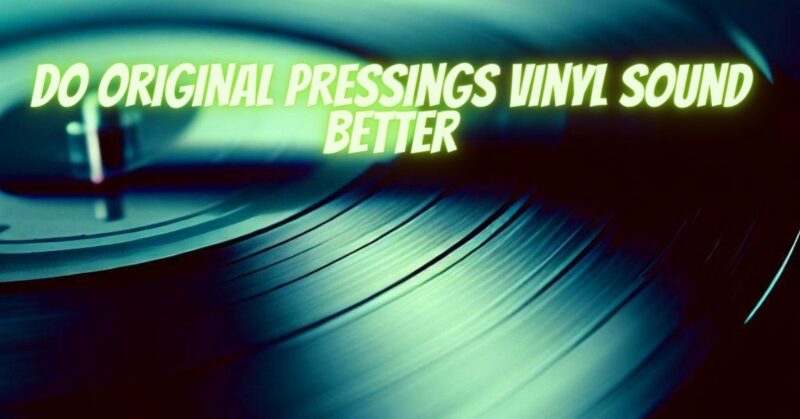Vinyl records have experienced a remarkable resurgence in recent years, attracting both dedicated audiophiles and newcomers to the world of analog audio. Within the vinyl community, a longstanding debate revolves around the perceived sound quality differences between original pressings and reissues. In this article, we will explore the myths and realities surrounding this debate, shedding light on whether original pressings genuinely offer superior sound quality or if reissues can deliver an equally impressive listening experience.
The Allure of Original Pressings
Original pressings of vinyl records are often highly sought after for several reasons:
- Historical Significance: Original pressings represent the earliest release of an album and hold historical significance in the world of music.
- Collector’s Value: Many collectors covet original pressings for their rarity and collectible nature, which can make them valuable on the secondary market.
- Mastering Differences: Some argue that original pressings, created from the original master tapes, offer a unique sonic quality that captures the artist’s intended sound.
The Reality of Original Pressings
While original pressings do have historical and collectible appeal, their perceived sonic superiority is often overstated. Here are some considerations:
- Aging and Wear: Original pressings are often decades old and can suffer from wear, warping, and surface noise. These issues can significantly impact sound quality.
- Variability: Sound quality can vary between different original pressings of the same album, depending on factors like the pressing plant, quality control, and manufacturing conditions.
- Mastering and Quality Control: Not all original pressings were meticulously mastered or subjected to stringent quality control. Some may exhibit sonic flaws or inconsistencies.
The Advantages of Reissues
Reissues, or new pressings of classic albums, have several advantages:
- Remastering: Reissues often benefit from modern remastering techniques that can enhance sound quality and clarity. Engineers use updated technology to bring out the best in the original recordings.
- High-Quality Vinyl: Reissues are typically pressed on high-quality vinyl, reducing surface noise and improving overall sound fidelity.
- Consistency: Reissues from reputable labels tend to offer consistent sound quality, eliminating the variability associated with original pressings.
- Affordability: Reissues are generally more affordable than their original counterparts, making them accessible to a wider range of listeners.
Debunking the Myth: Sound Quality
The notion that original pressings always sound better than reissues is a myth. Sound quality is influenced by various factors, including the condition of the record, mastering quality, and pressing quality. Reputable record labels invest in remastering and pressing technologies to ensure that reissues faithfully capture the essence of the original recordings.
The debate between original pressings and reissues in the vinyl community is deeply rooted in nostalgia and collector culture. While original pressings hold historical value and can be prized collectibles, it’s important to recognize that reissues have come a long way in delivering exceptional sound quality. The choice between original pressings and reissues ultimately depends on your personal preferences and priorities as a listener or collector.
Whether you opt for the warmth and character of an original pressing or the enhanced sound quality and affordability of a reissue, both formats offer the unique pleasure of vinyl playback. In the end, it’s the music and the joy of listening that matter most, regardless of the label on the record or its place in history.


